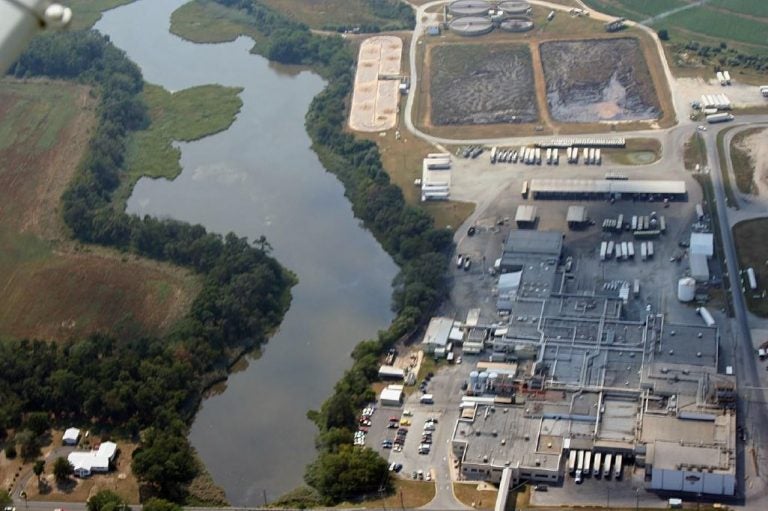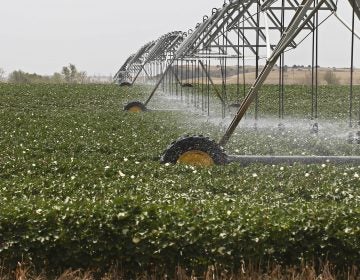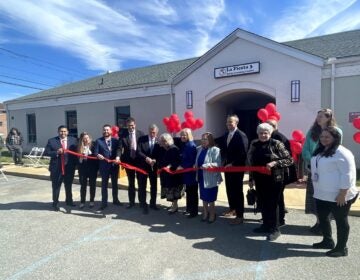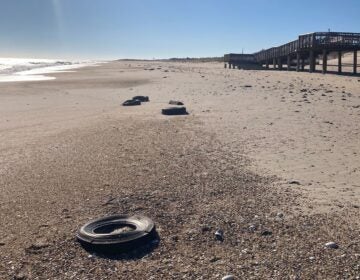Report: Chicken plant's chronic violations, lax state enforcement led to water contamination
A report issued by the Delaware Center for the Inland Bays claims violation at Mountaire's Millsboro facility were part of a chronic problem that led to water pollution.

An aerial image of Mountaire's Millsboro facility is included in the Delaware Center for the Inland Bays report about water contamination caused by the facility. (Courtesy Delaware Center for the Inland Bays)
In November, Delaware environmental regulators accused poultry processor Mountaire Farms of 13 permit violations that led to water contamination for nearby residents.
A report issued Monday by the Delaware Center for the Inland Bays claims those violations were part of a chronic problem at the plant that has resulted in “significant pollution” of waters that are granted “the state’s highest level of protection.”
“It’s not just disheartening and frustrating for us, but for really all of the organizations and businesses that have done the right thing, that have stepped up and met regulations and requirements and have sacrificed to do that,” said Chris Bason, executive director of the Center for the Inland Bays.
The 24-year-old nonprofit center was created to help restore and preserve the waterways that are considered jewels of coastal Sussex County.
Using publicly available information and details obtained through Freedom of Information Act requests, the center’s report says the EPA and the state Department of Natural Resources and Environmental Control have not forced the company to comply with conditions of multiple orders.
“It is a very unfortunate set of circumstances that got us to where we are right now, and obviously in hindsight, it would have been great if actions had been taken sooner,” said Scott Andres, a board member with the Center for the Inland Bays.
The report says failures of Mountaire’s wastewater treatment facility resulted in the chicken processor exceeding legal limits for pollutants in water that is sprayed on fields in southern Delaware. Higher-than-allowed levels of fecal coliform, chlorine, and nitrates were found on multiple occasions from April through September of 2017, according to a violation notice filed last year by the Department of Natural Resources and Environmental Control.
By August 2017, DNREC reported that Mountaire had already exceeded the total amount of nitrogen it was allowed to apply to its farm fields for the whole year. “Reporting through August shows nine out of 13 fields have already exceeded the limit for the calendar year 2017,” the violation notice said. “August’s report alone showed six fields were loaded in excess of the [annual] permit limit just in the month of August.”
Following the notice of violations from DNREC in November, Mountaire fired workers at its Millsboro wastewater treatment. The company said the workers were not doing their jobs. At the time, Mountaire said the company had hired new wastewater employees and was working with DNREC to resolve the high levels of nitrates in water that was sprayed on nearby fields.
In addition to negative impacts on drinking water, the Center for the Inland Bays report says the contamination has contributed to high levels of nitrogen in the Indian River. “The average total nitrogen concentration here is over twice the healthy limit for the river,” the report reads. “Phosphorous is 40 percent higher than the healthy limit, and floating algae (measured as chlorophyll) is more than five times greater than the healthy limit.”
“The same contamination that is affecting groundwater in the area is also affecting the health of the bays and the river, just because that groundwater flows toward the river and it eventually enters it,” Bason said.
He hopes the report would help fulfill the center’s mission of educating the public on the importance of protecting our water. The center is hosting a river rally in Millsboro next month to celebrate the importance of water and to highlight the work the group is doing to bring attention to ways residents can help protect water from pollution.
Mountaire officials did not return WHYY’s requests for comment Monday.
WHYY is your source for fact-based, in-depth journalism and information. As a nonprofit organization, we rely on financial support from readers like you. Please give today.






